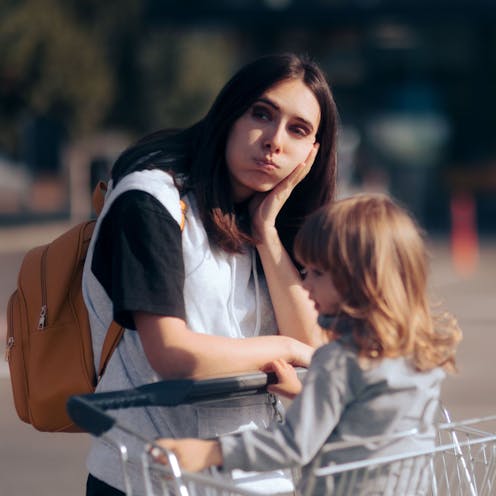
Food insecurity – difficulties getting enough nutritious food for a healthy life – is a growing problem globally. It has been linked to many health and social problems including malnutrition, difficulties managing diabetes, impaired development in childhood, and reduced school performance for children.
Our recent research shows how food insecurity also matters for reproductive justice: people’s ability to have only the children they want and raise them the way they want.
Led by Black women, the reproductive justice movement began in the US in the 1990s.
Awful acts of violence, such as forced sterilisation and child removals, have aimed to prevent the most marginalised people from having and raising children. Reproductive justice highlights how marginalised people’s options are systematically limited by the way our societies are organised.
Reproductive justice activists assert that everyone has the right to have a child or – equally – to not have a child. If people choose to have children, they should be able to parent them with dignity in safe and healthy environments. In our research, we show how food insecurity can restrict each of these rights.
Why food insecurity matters
For one thing, food insecurity affects nutrition. Malnutrition is linked with infertility and poorer pregnancy and birth outcomes. This affects both the right to have a child and the right to parent in safe and healthy environments. It is impossible to provide a healthy environment for a child without access to sufficient nutritious food.
And food insecurity can make it hard to meet other basic needs. Food insecure people are more likely to live in unfit housing conditions, or even without a home entirely. They can face impossible spending choices, such as whether to spend on food versus heating or cooling their home. Having to make trade-offs between food and other necessities is a barrier to the right to parent in safe and healthy environments.
Impossible spending choices also affect access to reproductive healthcare. Where healthcare systems charge for service, food insecure people face challenging decisions of whether to use their limited funds on food or healthcare.
And even where healthcare is free in principle – such as the NHS in the UK – there can be hidden cost trade-offs. Missing work to attend a healthcare appointment can mean less money for food. For people in precarious work who are more at risk of food insecurity, missing work could mean losing their job, placing future wages at risk.

Such impossible decisions between spending on reproductive healthcare and food affect both the right to have, and to not have, a child. It may limit access to contraception, abortion, prenatal care, infertility treatment, and other reproductive healthcare. Trade-offs between spending to feed one’s child versus to take them to a doctor also impede the right to parent with dignity in a healthy environment.
Food insecure people may resort to criminalised methods to obtain food, which can lead to a prison sentence. For example, in some countries sex work is criminalised, but it can be an important source of income. Broader food security crises, triggered by events such as regional conflict or the COVID-19 pandemic, may make criminalised strategies more likely.
In turn, disruption of routine reproductive healthcare in prison can negatively impact the right to have a child, and separating families through parental imprisonment compromises the right to parent. A criminal record may also limit employment opportunities and access to housing, increasing the risk of food insecurity after release from prison.
And these are only a few examples.
Why is this a timely issue?
Events such as the pandemic, conflict in places such as Ukraine, Sudan, Ethiopia, Yemen and Syria, and the cost of living crisis have made matters worse. Such events have disrupted global food supply chains, displaced people, and made basic necessities unaffordable. On top of everything, the climate crisis will compound these problems in the coming years.
Meanwhile, reproductive justice is a pressing – and linked – global issue. Though it’s been over 50 years since the UN acknowledged reproductive rights as a human right, reproductive choice continues to be compromised globally. Just one high-profile example is the restriction of women’s right to abortion following a landmark 2022 US Supreme Court Ruling.
Recognising the link between food insecurity and reproductive justice is important. The most marginalised people are at greatest risk of impediments to both food security and reproductive justice.
As an activist movement, grassroots action sits at the core of reproductive justice, with a commitment to elevate voices previously unheard or overlooked. There is much to be gained from collaborating with similar groups working to combat food insecurity to drive mutual learning and action.
Jasmine Fledderjohann receives funding from UKRI in the form of a Future Leaders Fellowship (grant number MR/T021950/1).
Maureen Owino is a Vanier Canada Graduate Scholarship (Vanier CGS) Scholar and receives funding from CIHR.
Sophie Patterson receives funding from NIHR in the form of a Clinical Lectureship, in addition to a Clinical Lecturer Starter Grant from the Academy of Medical Sciences.
This article was originally published on The Conversation. Read the original article.







